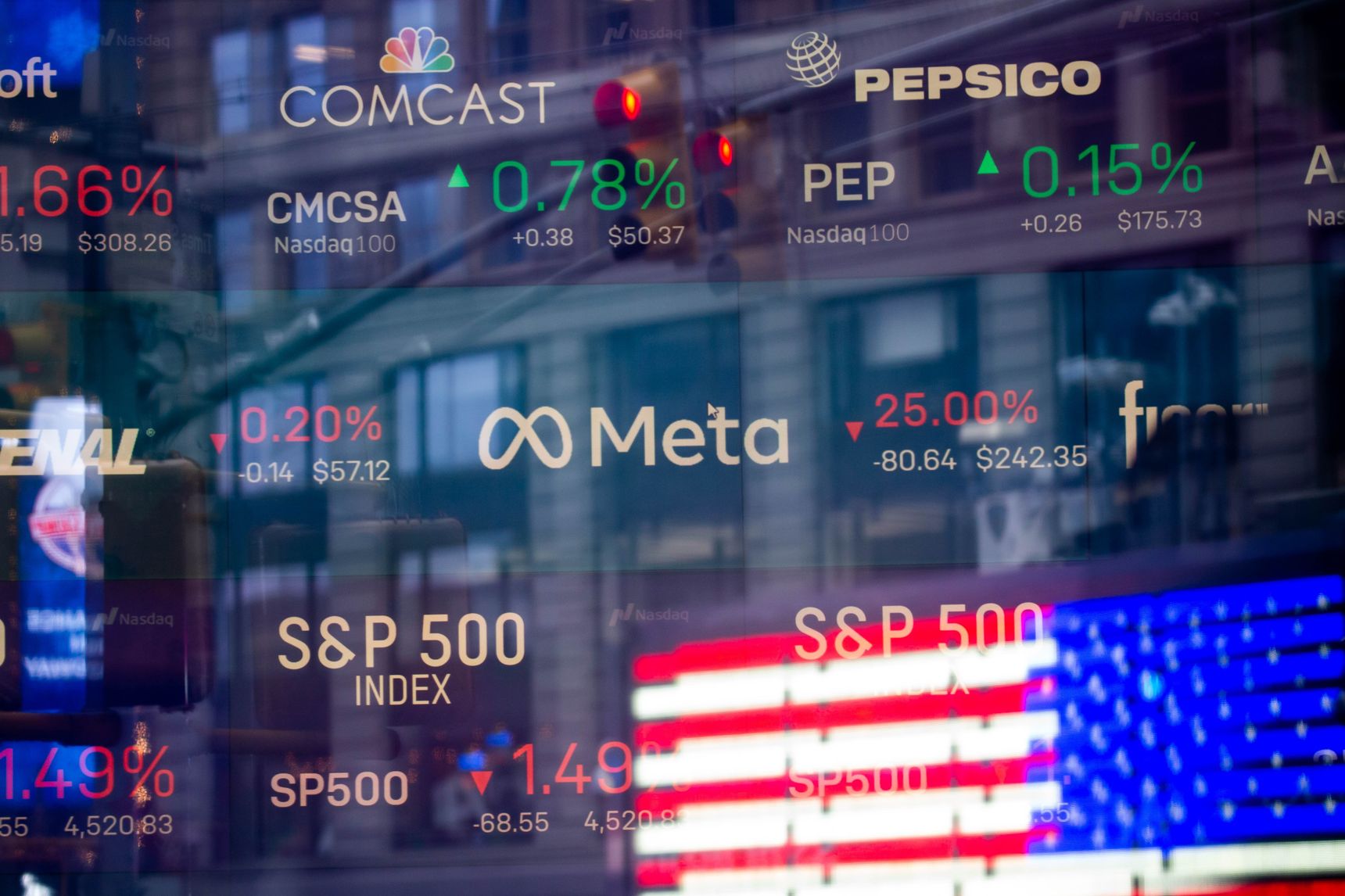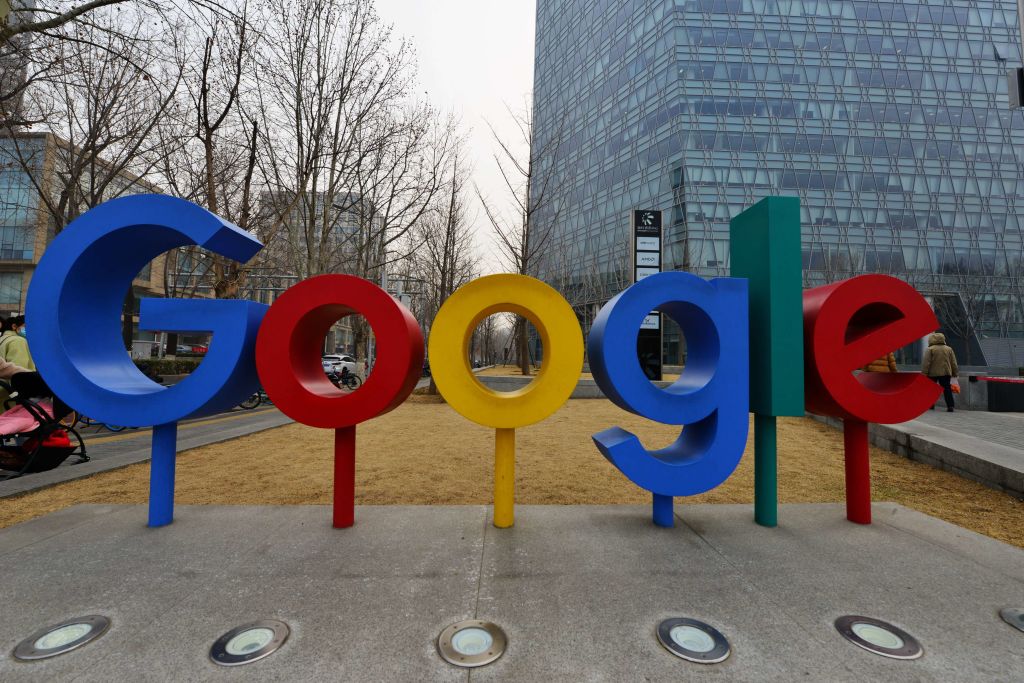What We Don’t Know About The Stock Market
Meta’s down, Amazon’s up, and there are four big questions for investors.
Extraordinary moves in Big Tech stocks in response to small changes in their earnings show what a wacky market we’re in. Uncertainty about the future of the economy in general and the tech sector in particular are extremely high. In short, nobody knows anything.
The biggest moves in terms of dollar value were in Meta (Facebook-as-was on Thursday lost the most market value in a day of any U.S. company ever) and Amazon (which had the biggest market-value gain of any U.S. company ever on Friday). The uncertainty is deep, but there are common threads tying their moves into other hefty price swings in this earnings season.
Meta, Amazon, Snap, Paypal, Netflix and Spotify were among those having outsize moves in part because they have premium valuations based on expectations of long-term growth. Relatively small changes in the market’s best guess of that rate of growth have very large impacts on their value today, because so much of their earnings potential lies far in the future.
But the scale of the moves is also large because investors are wrestling with major unknowns, any one of which could hit stocks hard. Here are the four most important:
Will inflation hammer profit margins?
Companies are faced with soaring input costs, with producer prices rising even faster than consumer inflation, itself the highest year-over-year rate since 1982. Investors are closely focused on which businesses have the power to raise prices to offset higher costs. On Friday Clorox stock plunged 14%, the worst in the S&P 500, in large part because it warned about rising costs. Amazon was up 14% in part because its planned increase in the price of a Prime subscription reassured investors that it can offset soaring delivery and labour costs.
Will Covid-era gains fade?
Lockdowns accelerated the switch to many online services, but some will prove temporary. No one wants to be like Peloton Interactive, whose home cycling workout has proved tougher to sell when customers have the choice of outdoor exercise, and whose stock has lost three-quarters of its value since its peak a year ago. Some of the reason for Netflix’s big fall after its earnings was because it turns out people prefer real life to home movies; similarly, Clorox disinfectant sales have fallen back, and PayPal growth has slowed.
Will Big Tech eat itself?
One of the most attractive features of the leading online platform companies is the defensive benefit they get from being big, what are known as “network effects.” People use Facebook because other people use Facebook, so everyone has to use Facebook. Except, not so much. Meta stock tumbled 26% on Thursday primarily because TikTok is beating it in the competition for young eyeballs. Amazon and Apple made Meta’s situation worse, Amazon because it is snaffling advertising dollars at a rapid rate, Apple by changing privacy settings, something Facebook has struggled with.
Competition has already hit several other tech themes. Netflix has to spend heavily to maintain its position because of the streaming wars with services from Amazon, Disney, Comcast and others. Uber Technologies got an early lead in online taxi services, but it turned out to be an easy model to copy and many other services sprang up around the world, competing both for customers and drivers. The pattern is a standard one in tech: Microsoft has long since lost its virtual monopoly in operating systems and word-processing software, while IBM’s dominance of PC hardware is ancient history.
The battlegrounds of the future are cloud computing and self-driving cars, and the competition is keen. So far there’s no sign of a slowdown in the cash milked from the cloud by Amazon, Microsoft and to a lesser extent Alphabet, but all are investing heavily, and it might become competitive in time.
True self-driving cars aren’t for sale yet, but Alphabet, Apple and Tesla are all spending heavily on development and, in the case of Alphabet’s Waymo, some limited services. Amazon and Intel have bought in to the area, and a bunch of traditional carmakers have made progress, too. Whoever cracks it first might get a big lead, and would deserve a big valuation, but competition, as well as regulation, would surely follow.
Will bond yields carry on up?
Growth companies are highly sensitive to bond yields, because so much of their lifetime profits lie further in the future than cheaper businesses. Bond yields jumped again on Friday on the back of a strong jobs report, taking the 10-year Treasury yield up to where it started 2020 for the first time since then. If the economy stays strong and yields keep rising, it will be a headwind for the big growth stocks.
Change the answers to any of these questions and it justifies a big move—down in most cases—in the price of exposed stocks. The number of big price swings so far in this earnings season might be because coming out of the pandemic creates turning points in all these issues at once. But a question that nags at me is whether the unstable prices point to a deeper problem that could lead to much broader market troubles. Like everyone else, though, I don’t know.
Reprinted by permission of The Wall Street Journal, Copyright 2021 Dow Jones & Company. Inc. All Rights Reserved Worldwide. Original date of publication: February, 7, 2022.
 Copyright 2020, Dow Jones & Company, Inc. All Rights Reserved Worldwide. LEARN MORE
Copyright 2020, Dow Jones & Company, Inc. All Rights Reserved Worldwide. LEARN MORE
This stylish family home combines a classic palette and finishes with a flexible floorplan
Just 55 minutes from Sydney, make this your creative getaway located in the majestic Hawkesbury region.
Continued stagflation and cost of living pressures are causing couples to think twice about starting a family, new data has revealed, with long term impacts expected
Australia is in the midst of a ‘baby recession’ with preliminary estimates showing the number of births in 2023 fell by more than four percent to the lowest level since 2006, according to KPMG. The consultancy firm says this reflects the impact of cost-of-living pressures on the feasibility of younger Australians starting a family.
KPMG estimates that 289,100 babies were born in 2023. This compares to 300,684 babies in 2022 and 309,996 in 2021, according to the Australian Bureau of Statistics (ABS). KPMG urban economist Terry Rawnsley said weak economic growth often leads to a reduced number of births. In 2023, ABS data shows gross domestic product (GDP) fell to 1.5 percent. Despite the population growing by 2.5 percent in 2023, GDP on a per capita basis went into negative territory, down one percent over the 12 months.
“Birth rates provide insight into long-term population growth as well as the current confidence of Australian families,” said Mr Rawnsley. “We haven’t seen such a sharp drop in births in Australia since the period of economic stagflation in the 1970s, which coincided with the initial widespread adoption of the contraceptive pill.”
Mr Rawnsley said many Australian couples delayed starting a family while the pandemic played out in 2020. The number of births fell from 305,832 in 2019 to 294,369 in 2020. Then in 2021, strong employment and vast amounts of stimulus money, along with high household savings due to lockdowns, gave couples better financial means to have a baby. This led to a rebound in births.
However, the re-opening of the global economy in 2022 led to soaring inflation. By the start of 2023, the Australian consumer price index (CPI) had risen to its highest level since 1990 at 7.8 percent per annum. By that stage, the Reserve Bank had already commenced an aggressive rate-hiking strategy to fight inflation and had raised the cash rate every month between May and December 2022.
Five more rate hikes during 2023 put further pressure on couples with mortgages and put the brakes on family formation. “This combination of the pandemic and rapid economic changes explains the spike and subsequent sharp decline in birth rates we have observed over the past four years,” Mr Rawnsley said.
The impact of high costs of living on couples’ decision to have a baby is highlighted in births data for the capital cities. KPMG estimates there were 60,860 births in Sydney in 2023, down 8.6 percent from 2019. There were 56,270 births in Melbourne, down 7.3 percent. In Perth, there were 25,020 births, down 6 percent, while in Brisbane there were 30,250 births, down 4.3 percent. Canberra was the only capital city where there was no fall in the number of births in 2023 compared to 2019.
“CPI growth in Canberra has been slightly subdued compared to that in other major cities, and the economic outlook has remained strong,” Mr Rawnsley said. “This means families have not been hurting as much as those in other capital cities, and in turn, we’ve seen a stabilisation of births in the ACT.”
This stylish family home combines a classic palette and finishes with a flexible floorplan
Just 55 minutes from Sydney, make this your creative getaway located in the majestic Hawkesbury region.





















